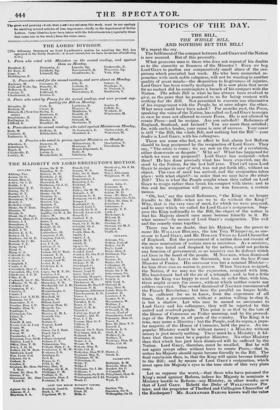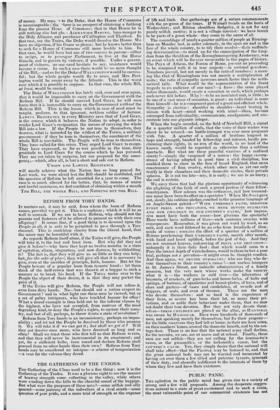TOPICS OF THE DAY.
THE BILL,
THE WHOLE BILL, AND NOTHING BUT THE BILL!
WE repeat the cry.
The fulfilment of the compact between Lord GREY and the Nation is now assured. But of this presently.
What generous man is there who does not repent of his doubts as to the sincerity or firmness of the Minister ? Even we beg Lord GREY to pardon our comparatively small share of the sus- picions which prevailed last week. He who bore unmerited re- proaches with such noble calmness, will not be wanting in another quality of great minds—the disposition to forgiveness of injuries.. Lord GREY has been cruelly maligned. It is now plain that never • for an instant did be contemplate a breach of' his compact with the Nation. The whole Bill is what he has always been resolved to give, as the price that he promised to us for being content with nothing but the Bill. Not permitted to execute one alternative of his engagement with the People, he at once adopts the other. What more could have been asked ? For months past, the Press, speaking the voice of the Nation, has called on Lord GREY to resign in case he were not allowed to create Peers. He is not allowed to create Peers—and he resigns. Are you satisfied? Reformers of England, Scotland, and Ireland ! You are more than satisfied; for, with such a leader, your cause is sure of success. Your cause is still " the Bill, the N% hole Bill, and nothing but the Bill"—your leader is Lord GREY, with his colleagues. • There are some who feel, or affect to feel, alarm lest Reform should be long postponed by the resignation of Lord GREY. They say, ," The crisis is come; we are now on the eve of a revolution, either democratic or despotic." Why so? What has happened for which we were not prepared? Lord GREY has resigned—what then? He has done precisely what has been expected, nay de- • sired by the Nation, for the last half year. That call upon Lord GREY to resign in case of need, was not put forth idly, without an object. The case of need has arrived, and the resignation takes plaee : with what object?—in order .that we may have the whole - Bill ! This is what the People sought when they called on Lord • GREY to resign rather-than break his compact with them; and to • this end his resignation will prove, as was foreseen, a certain means.
"Oh, but,- say the timid Reformers, " the King is no longer friendly to the Bill—what are we to do without the King?" "Why, that is the very case of need, for which we were prepared, and to meet which we called -for Lord GREY'S resignation. Sup- • pose the King unfriendly to the Bill, the object of the nation is • that his Majesty should once more *become friendly to it. By what means?—by means of Lord GREY'S resignation. The evil ' and the remedy come together.
There can be no doubt, that his Majesty has the power to ' name Mr.WILLIAM Hot.mEs, the late Tory Whipper-in, as suc- cessor to Lord GREY, and Mr. IIORACE Twiss as Lord Chancellor of England. But the government of a nation does not consist of the mere nomination of certain men as ministers. As a ministry, which was hated and despised by the nation, could not perform any function of government, so no ministry can be deftmet which yet lives in the heart of the people. M.NEciikt, when dismissed and banished by Louis the Sixteenth, was not the less Prime Minister of France. His successor was but a nominal Minister— for him there was no nation to govern. When NECKER resigned, the Nation, if we may use the expression, resigned with him. His banishment had all the air of a triumph; and in but a little while the King was happy to recut him, in order that, with him, • there might return the money, without which neither courts nor coblers can exist. The second dismissal of NECKER consummated the French Revolution; but here the parallel no longer holds. It is sufficient for us to know, from the experience of all • times, that a government, without a nation willing to obey it, is but a shadow. Let who may be named as successors to Lord GREY and his colleagues, they will be rejected by this united and resolved people. This point is se tied by the vote of the house of Commons on Friday morning, and by the proceed- ings of the People in all parts of the country. The King, it is true, may name a Ministry; but the People, and its organ, a popu- lar majority of the House of Commons, hold the purse. An un- popular Ministry would be without money: a Ministry without money is just merely nothing. There must be a Ministry; it fol- . lows that there must be-a popular Ministry. No other Ministry than that which has just been dismissed will be suffered by the Nation. Lord GREY, therefore, must be recalled. - But he will not again accept office without leave to create Peers,—that is, unless his Majesty should again become friendly to the Bill. The final conclusion then, is, that the King will again become friendly to the Bill; and by means of Lord GREYS resignation, which must open his Majesty's eyes to the true state of this very plain case.
Let us suppose the worst,—that those who have poisoned the King's mind against Reform, induce his Majesty to nominate a Ministry hostile to Reform—any Ministry, in other words, save that of Lord GREY. Behold the Duke of WELLINGTON Pre mier, and the proprietor of Thetford and-Callington Chancellor of the Exchequer! Mr. ALEXANDER BARING knows well the value of money. He repo. 'a to the Duke, that the House of Commons is unmanageable; tha there is no prospect of obtaining a farthing from the present Holm, of Commons; that in that House he is still nothing else but plait ALEXANDER BARING, loan-monger to the Holy Alliance, and purchaser of Callington and Thetford. In that case, say the Tories, the Duke would dissolve the House. We have no objection, if his Grace so please; but he knows better than to seek for a House of Commons still more hostile to him. In that case, he would have but one of two courses to pursue—either to resign, or to prorogue Parliament, to live at the Horse Guards, and to govern by violence, if possible. Under a govern- ment of violence, no one need hesitate to say, resistance would become a virtue. .In such a case there would be no more thought of the Bill,—and so far the Duke of WELLINGTON would be success- ful; but the whole people would fly to arms, and Mrs. Part- ington would be swept away by the Atlantic. This is the worst case which it-is possible to suppose. In that case, the whole Bill, at least, would be carried.
The Duke of WELLINGTON has lately said, over and over again, that it would be impossible to carry on the Government with the Reform Bill. If he should succeed Lord GREY, he will soon learn that it is impossible to carry on the Government without the Reform Bill. This is the lesson which in case of need must be taught, perforce, to that ignorant, reckless soldier of fortune. LAWFUL RESISTANCE to every Ministry save that of Lord GREY, is the course which it behoves the Nation to adopt, in order to render Lord GREY'S resignation the means of carrying the whole Bill into a law. If the People be not true to themselves, they deserve, what is intended by the wildest of the Tories, a military government : if they be true to themselves, the enactment of the whole Bill is inevitable. The People will be true to themselves. They have called for this crisis. They urged Lord GREY to resign. They have expressed, as far as was possible in the time, their gratitude to Lord GREY for the course which he has pursued. They are not taken by surprise, but are prepared for the emer- gency,—which, after all, is but a short and safe cut to Reform.
UNION AND LAWFUL RESISTANCE
will surely achieve what the Nation has so long prayed for. Last week, we were afraid lest the Bill should be mutilated, and the question of Reform be left unsettled for a year to come. The case is so much altered for the better, that, by means of union and lawful resistance, we feel confident of obtaining within a mouth THE BILL, THE WHOLE BILL, AND NOTHING BUT THE BILL.



























 Previous page
Previous page